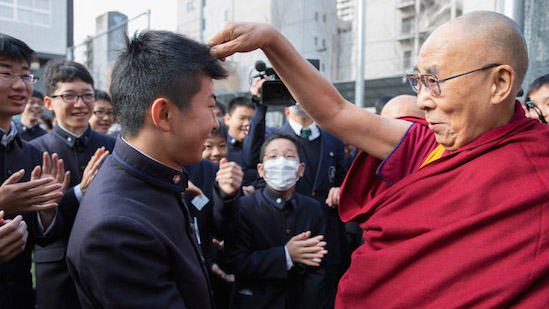OSAKA: His Holiness the Dalai Lama held an interactive discussion with 3,000 students and teachers at Seifu Gakuen Boys High School in Osaka, which closely follows Buddhism, Japan’s third largest populated city. The theme of the discussion was “Buddhism in the 21st Century”.
His Holiness said how the present century will take shape solely depends on vision of today’s youth.
“Though the 20th century witnessed tremendous technological advancement, but two world wars and development of nuclear weapons resulted in the death of over 200 million people. There were regular wars in the beginning of the last century as people at the time take pride in retaliating when others declare war against them. However, this negative trend gradually changed in the later half of the century with the advent of dialogue as a means to resolve conflicts,” His Holiness said, encouraging the students to envision a more peaceful and happier 21st century.
His Holiness said the violent conflicts taking place in early part of this century is a result of mistaken view of the people of the 20th century who resort to violence to achieve victory for oneself and defeat for others. “So the 20th century was not a happy century. Therefore the responsibility to make a happy 21st century solely lies on you,” His Holiness told the students.
“Our generation is gradually disappearing. I have witnessed series of wars including the Second World War, Vietnam war, Korean war and civil war in China. The 20th century was not happy and peaceful century. So it is important to think about how to make this century more happier and peaceful. In my lifetime, To achieve this depend solely on how today’s younger generation’s effort and positive vision. The youngsters must think about the repercussions of the past century’s wars and violence. You must make efforts and have visions to shape this century,” he added.
His Holiness then asked the students to raise their hands if they feel that the 20th century was a happy century. Only one student raised his hand. When he asked them to raise their hands if wish for a happy 21st century, everyone raised their hands.
His Holiness said education is key to make this century a peaceful and happier society. “The modern education system is about material development and lacks focus on inner values. So, both teachers and students should pay attention on developing inner values and peace of mind by incorporating secular ethics a part of the curriculum,” he said.
His Holiness emphasized that human affection is very important factor to bring inner peace and relief to oneself. Unlike flowers and animals, human beings have qualities of intelligence and emotions. “When a close and loyal friend consoles when someone is angry and mind is disturbed it brings real relief. So human affection is very precious quality. Even animals love when we take care of them with affection. On the other hand, flowers don’t have this quality. ”
He said we should use our intelligence and unique expression of smiling to fight against ignorance and build trust with fellow human beings. “In their research findings, modern scientists have proved that self-centered attitude causes more anxiety and fear in mind, which results in the destruction of human’s immune system. On the other hand, a sense of concern for other human beings reduces the negative emotions and helps to build trust, inner peace and healthy physical body.”
Responding to questions from the students, His Holiness advised them to utilize human being’s unique quality of smiling. He said Japan lacks contact with the outside world and encouraged them to make greater contact with the outside world and learn English to do so. His Holiness said using his broken English he traveled to different parts of the world and make friends.
His Holiness said basic human nature is compassionate, which is the basis of our hope. and genuine human smile is the expression of love and affection. If the basic human nature is negative then no hope.
Speaking on his interest to visit China, His Holiness said I have a keen desire to visit China for pilgrimage to Buddhist sites. But the government thinks I am a ‘splittist’. So I have to wait. If the Chinese government shows some positive indication, then I can go. But if I go there as a ‘splittist’ as accused by the Chinese government then I may get handcuffed at the airport. His Holiness added we do not seek separation from China. What we are asking is rights enshrined within the framework of the Chinese constitution. We have made this position clear to the international community.
His Holiness said human beings have brain and intelligence to use for constructive or destructive things depends on the motivation. Our actions will become positive and productive if we use our brain with wisdom and warm-heartedness.
His Holiness praised the spirit and determination of the Japanese to build from the ashes of two nuclear bomb catastrophes. He emphasized for efforts to ban use of nuclear weapons.
Tomorrow, His Holiness will give a Buddhist teaching on Shantideva’s A Guide to Boddhisattvas Way of Life at Seifu High School in Osaka.
-Report filed by Lobsang Choedak from Japan-

